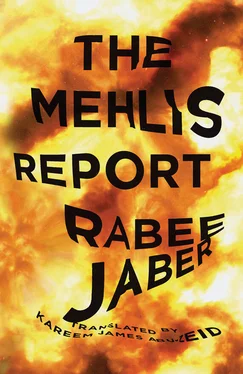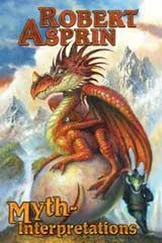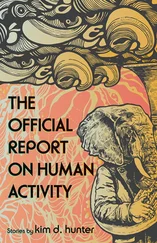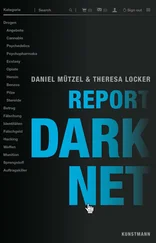When will they finish the Bank of Kuwait and the Arab World at the intersection of Foch and Weygand? The building permit says it will be done in 2008. There’s another construction site where Foch and Al-Mina come together: the Foch Residence Building. Wooden boards fence in a deep pit. Bulldozers are hard at work. The smell of mud and stone: the laying of the foundation has begun. The steel bars. The pouring of cement. A steel plate proclaims the work will be completed in May 2007.
Saman Yarid will not see these towers. The noise doesn’t let up all day. The whole place, from Foch Street to the Saint Georges Hotel, is one big construction site. Noise and dust and movement. The cranes’ yellow steel arms cover the sky. But the sun has set. The blue of daylight turns to orange, then dark gray, then black. Night falls on Beirut. The construction lets up, and dies away. The place is empty. People are in their homes now. The streets are still.
A man lies on the ground between the Balthus restaurant and Berytus Parks, and breathes his last. A car goes by, but the bright yellow headlights don’t light up the other side of the road. This restaurant is famous for its fish soup — its sumptuous Friday meal. A single bowl costs fifty dollars, but it’s the best fish in the city. The restaurant only serves that soup on Fridays. On Tuesdays they serve prawns with rice. On Mondays they cook up chicken with thyme. And on Fridays: fish soup.
It’s not Friday yet. Tomorrow’s Friday. Tomorrow’s the Mehlis Report. It’s still Thursday evening. The streets of Beirut are unusually empty. There are soldiers and policemen and military vehicles at every intersection. The people of Beirut are waiting for the report. This evening, or sometime during the night, or tomorrow at dawn, the Mehlis Report will be released. The German prosecutor delivered it to Kofi Annan two hours ago.
It’s not Friday morning yet. On Friday morning, at dawn, the report will be released to the satellite news stations. There will be a four-hour simultaneous translation of the entire report from English into Arabic on Al-Jazeera. The city’s houses will be lit up in blue, the blue of television screens. The TVs will flicker behind the windows and curtains. The streets will still be sunk in darkness. Everyone will hold their breath. Faces half asleep. And faces fully awake. Watching and listening to the translation. The bodies all electric. The report finally here. Now we’ll know what we wanted to know. What will we know?
It’s not Friday morning yet. A damp salty breeze rustles through the row of palm trees. The body stretched out on the sidewalk by the Balthus has stopped moving.
I don’t see my family very much. I go and visit them from time to time, but not too often. I don’t know how to act around them: my mother and father, my grandparents. They sit on the sofa beneath the oak tree, or on the balcony. They drink water in silence, each reading a book. And whenever they look up at me, I’m at a loss as to what to do. I don’t visit them much.
I read, and write, and work in the library. I don’t even turn on the TV all that often. I have yet to be cured of my longing for the land of the living, but the TV doesn’t give me what I need. I read and lose myself between the two shores of a book. I lose myself as I gaze at the fields, and then at the city. I walk down a long road lit up by streetlights, their gold flowing forth. The humidity creates shining planets around those lights. I hear music, and voices. I can smell the fried potatoes, the eggplant, the cauliflower. I read and lose myself in the world I left.
Here I am in his room. I haven’t forgotten it. The old curtains, the sun shining behind them. The big wooden bed. The dresser with a radio and cassette tapes on top of it. The green glass ashtray. Was it green or blue? How could I have forgotten? The memories are escaping. They slip like sand between your fingers. I’ve forgotten the color of the ashtray. But I still remember the stains on the ceiling, and how the paint seemed to ripple like the surface of the sea. And I remember the smell of his hands. His long fingernails. How he used to stand in front of the gas stove silently making tea. The sun shining through the cloth of the curtains. The sounds from the street. A car horn. A bell ringing in the distance.
The rat is looking for me. It’s hungry. Johannes has told me not to leave the library — unless I want to get rid of all my longing, that is. That would be best for you, he said. No one can find peace in death with so much longing in their veins.
I replied that he too missed the world. Didn’t he too long for life? I asked.
He said nothing.
I told him I’d heard he even traveled to the other side sometimes. Was that true? Are there points where you can cross over?
Johannes laughed and said only the Druze can do that. Then he fell silent, as if his own laughter had saddened him.
I said people told me that whenever he disappeared for a while, he was over there.
“And you believed them? We’re dead, Josephine. No one crosses from the land of the dead to that of the living. No one. When someone dies, they’re dead.”
I know, I said. Do you think I don’t know?
He looked at me and said nothing.
But there are many things I don’t know yet. I know some things, and am ignorant of others. I’ve seen some things, and haven’t seen others. In the big hall I watch the people as they write. They move lightly whenever they get up to go to one of the water fountains, as if they’re swimming. People become lighter once they reach these parts. Their faculties are restored. The pain in their bodies falls away. In one of the corridors I see Hariri sitting and reading twenty pages. Each time he finishes, he starts over. There’s a single life story on each page. Those are the stories of the people who were killed with him in the explosion. The final page was written by the medic in the ambulance, the last vehicle of the motorcade. In another corridor — at one end of the library — I see the man who had a bomb explode beneath his car seat. This man used to be a writer. But writing is no easy task for him here. The words no longer come to him like they used to. He’s not sure how to write what he wants to write. He wants to write a note to his wife. He wears himself out writing five letters, five single characters. He can’t find a sixth one. He can’t find a second word. The blast is still ringing in his ears, the black smoke still thick in his eyes. The Alfa Romeo is a small car. The pressure of the explosion was horrible in that cramped space. He drinks some water and looks at the word on the white page. And as he looks at that name, the smoke clears and the blast recedes. He sees a long street between two rows of shops. He sees the many kinds of sweets in the storefront windows. This is Paris. He knows these red and yellow awnings. There’s the Librairie Gilbert . The restaurants of Saint-Germain. The full glasses. The drizzling rain. The cloth umbrellas. The baguettes. The heads of broccoli in front of the shops. The bottles of wine. He knows what he’ll write. But he needs time. He only just arrived. The place is still new to him. He needs sleep. He’ll write after he sleeps.
In another narrow corridor, a man is lying on a bed. His bare leg looks skeletal, wasted away. He rubs some ointment on it and takes a sip of water from a plastic cup.
In a different corridor, a man sits at a table and writes that he didn’t know what to do when he saw the flames envelop his friend’s body. He wanted to help him but couldn’t move. He couldn’t move because he had died before his friend, whose clothes were on fire. He was dead, but only realized it later.
The man engulfed in flames did not die then. They flew him to Europe. He underwent several operations. They grafted new skin onto him to repair the burnt surface of his body. He spent thirty days in intensive care, and still he did not die. But his lungs were full of smoke: he was exhaling it. And finally it choked him. He died. After his death he opened his eyes and saw himself walking among pine trees. There was a long staircase at the end of the trees. He went down the steps and found a green playing field. He walked around the field and exited through a steel gate onto a wide corniche. He stood on the sidewalk and looked at the sea. The vast blue sea stretched to infinity, like the sky. A light rain was falling from above. A sweet immaculate calm filled that land. He felt he wasn’t alone. He looked at the raindrops as they danced on the sea, as they jumped on the calm surface of the water, rising then falling, rising then falling, and felt drowsy.
Читать дальше












